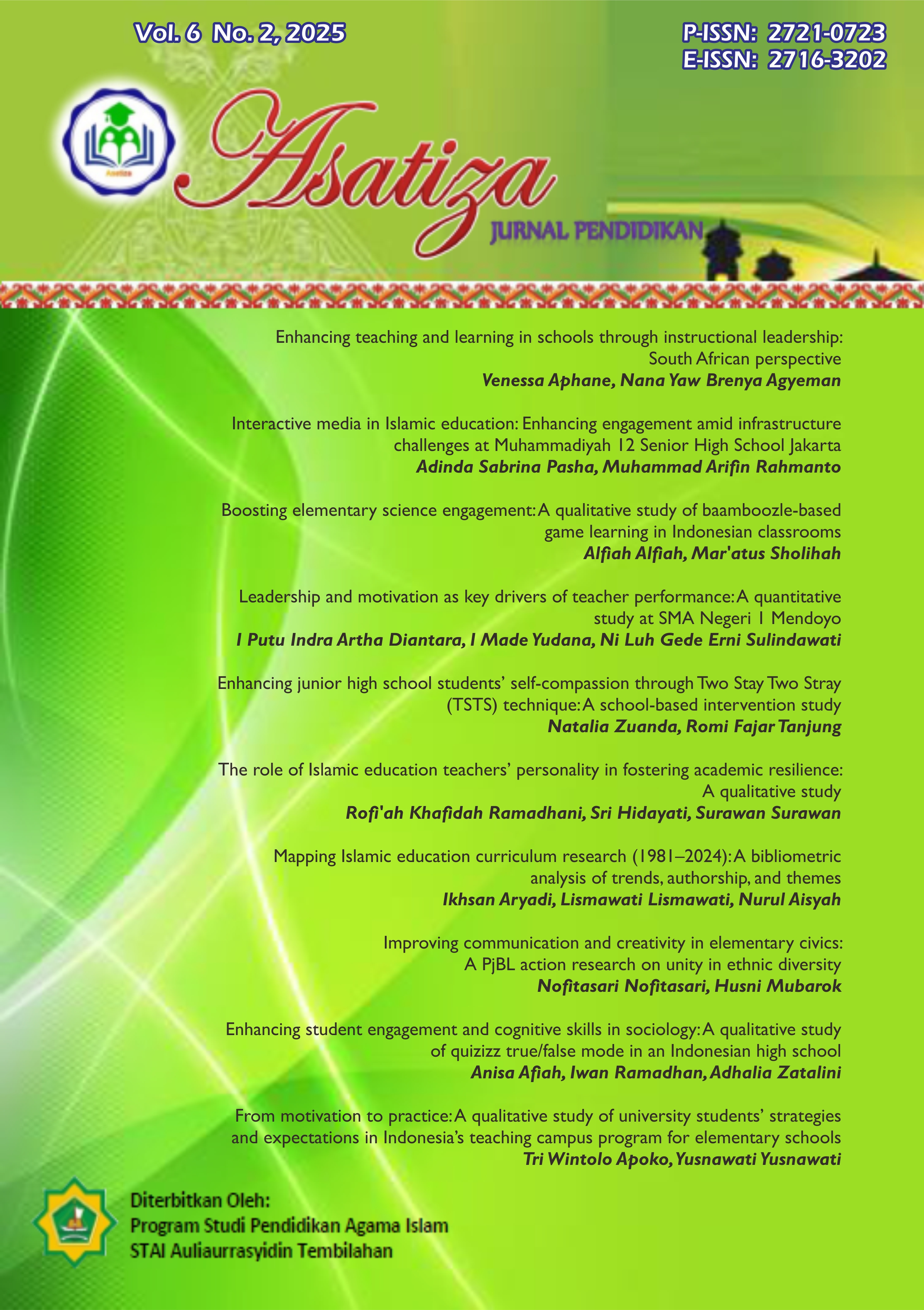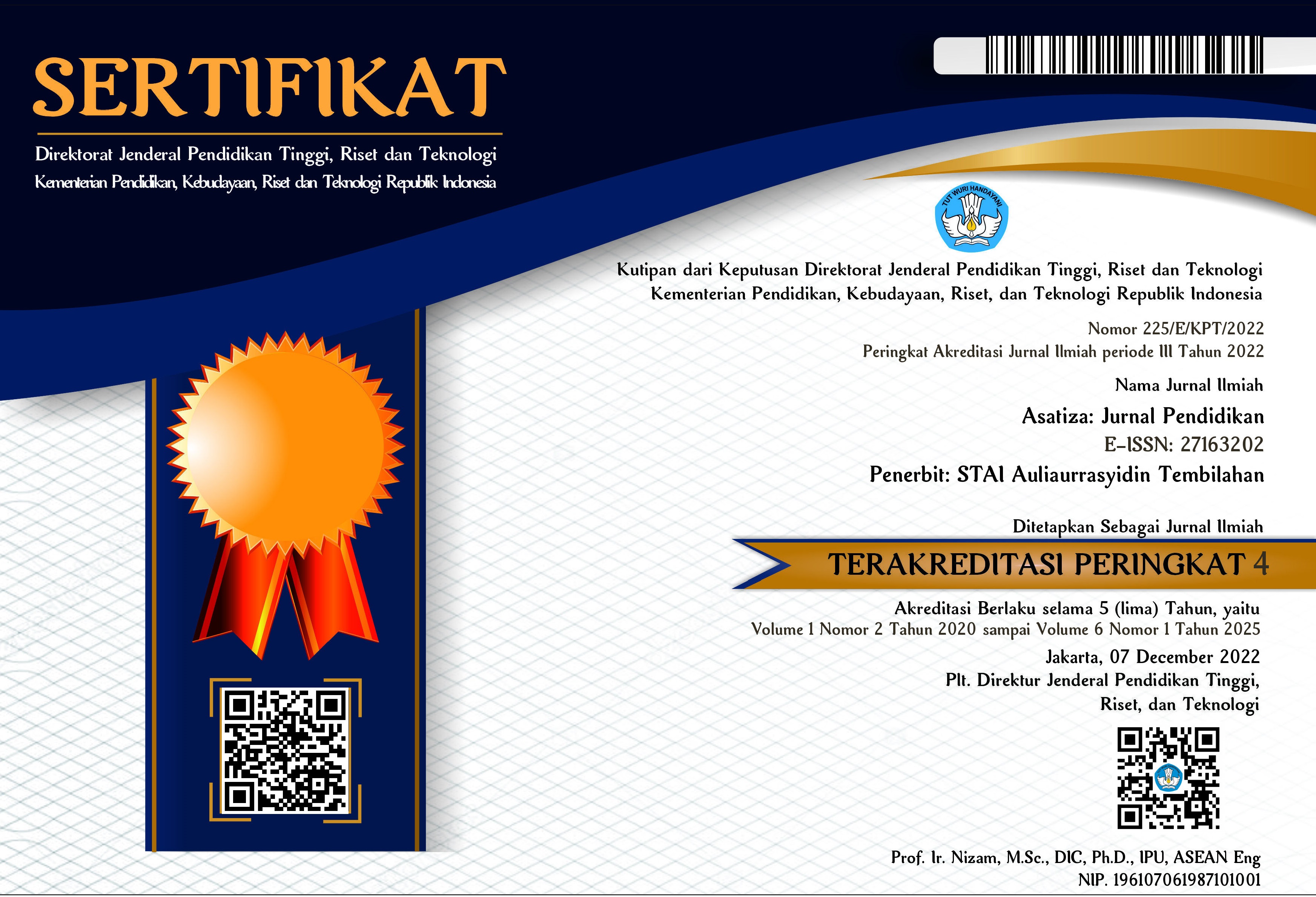The role of Islamic education teachers’ personality in fostering academic resilience: A qualitative study
DOI:
https://doi.org/10.46963/asatiza.v6i2.2758Keywords:
Academic Resilience, Islamic Religious Education, Teacher Personality CompetenceAbstract
Academic resilience refers to an individual’s ability to endure, recover, and adapt to academic challenges. This qualitative study explores the role of Islamic Religious Education (PAI) teachers’ personality competence in fostering students’ academic resilience at SMP Negeri 3 Katingan Hilir. Data were gathered through classroom observations (conducted twice in each of Grades VII, VIII, and IX), in-depth interviews with the school’s PAI teacher (the primary participant), and triangulation with three students and another teacher. Thematic analysis demonstrated that the teacher’s personality traits significantly enhanced students’ confidence, commitment, control, and composure. Specifically, 78% of observed student interactions showed improved self-regulation after teacher-led mentoring sessions. These findings align with Islamic values such as sabr (patience) and tawakkul (trust in God), which students adopted as psychological anchors during academic difficulties. The study identifies two key mechanisms underlying this influence: first, the teacher’s role-modeling of resilient behaviors, and second, faith-based coping strategies that frame challenges as opportunities for spiritual growth. These results suggest the importance of incorporating personality-focused teacher training and Islamic resilience frameworks into pedagogical practices, particularly in Muslim-majority educational settings.
Downloads
References
Alimni, A., Amin, A., & Kurniawan, D. A. (2022). The role of Islamic education teachers in fostering students’ emotional intelligence. International Journal of Evaluation and Research in Education (IJERE), 11(4), 1881-1892. http://doi.org/10.11591/ijere.v11i4.22116
Amalia, A., Muna, Z., Pratama, M. F. J. (2024). Hubungan antara dukungan sosial dengan resiliensi akademik pada santri akhir Pesantren Modern Al-Zahrah. INSIGHT: Jurnal Penelitian Psikologi, 2(2), 303–314. https://doi.org/10.29103/insight.v2i2.15210
Bernard, Β. (1991). Fostering Resiliency in Kids: Protective Factors in the Family, school, and Community. San Francisco, CA: WestEd Regional Educational Laboratory.
Braun, V., & Clarke, V. (2006). Using thematic analysis in psychology. Qualitative Research in Psychology, 3(2), 77–101. https://doi.org/10.1191/1478088706qp063oa
Fadilah, R., & Wardi, M. M. (2024). Strategi guru dalam meningkatkan keaktifan belajar siswa pada pembelajaran tematik di MIN 2 Lombok Barat Tahun Pembelajaran 2022/2023. Ibtida'iy: Jurnal Prodi PGMI, 9(1), 24-34. https://doi.org/10.31764/ibtidaiy.v9i1.23013
Hamdanah, H., & Surawan, S. (2022). Remaja dan Dinamika; Tinjauan Psikologi dan Pendidikan. K-Media.
Hanaris, F. (2023). Peran guru dalam meningkatkan motivasi belajar siswa: Strategi dan pendekatan yang efektif. Jurnal Kajian Pendidikan Dan Psikologi, 1(1), 1–11. https://doi.org/10.61397/jkpp.v1i1.9
Irawan, R., Renata, D., & Dachmiati, S. (2022). Resiliensi akademik siswa. Orien: Cakrawala Ilmiah Mahasiswa, 2(2), 135–140. https://doi.org/10.30998/ocim.v2i2.8130
Limbong, P. N. O. (2025). Kompetensi Kepribadian Guru PAI dan Dampaknya Terhadap Motivasi Belajar Siswa. Komprehensif, 3(1), 32–40. https://ejournal.edutechjaya.com/index.php/komprehensif/article/view/1401
Malisi, M. A. S., Sardimi, S., Surawan, S., & Aldianoor, A. (2023). Contribution of PAI Teacher Personality Competence to Student Motivation in School Exams. Ta’dib, 26(2), 291. https://doi.org/10.31958/jt.v26i2.8437
Masten, A. S. (2025). Ordinary Magic. Guilford Publications.
Mazrur, M., Surawan, S., & Yuliani, Y. (2022). Kontribusi Kompetensi Sosial Guru dalam Membentuk Karakter Siswa. Attractive : Innovative Education Journal, 4(2), 281–287. https://doi.org/10.51278/aj.v4i2.452
Muflihah, S., Zahra, S. F., & Liwun, F. V. J. (2023). Peran Guru Kelas dalam Mengatasi Kesulitan Belajar Siswa Pasca Pandemi di Kelas III SD Negeri 15 Maripi Manokwari. Educasia: Jurnal Pendidikan, Pengajaran, dan Pembelajaran, 8(3), 195-205. https://doi.org/10.21462/educasia.v8i3.156
Nafisa, N. N. I., & Darmawan, D. (2025). Pengaruh kompetensi kepribadian guru terhadap pembentukan karakter setingkat sekolah menengaah atas. Karakter: Jurnal Riset Ilmu Pendidikan Islam, 2(2), 307–321. https://doi.org/10.5281/zenodo.1234567
Noorwahidah, N., Jasiah, J., & Hidayati, S. (2025). Implementasi model pembelajaran SSCS dalam meningkatkan belajar siswa di MTs Raudhatul Jannah. Jurnal Media Informatika, 7(1), 113–124. https://doi.org/10.1234/jmi.v7i1.5093
Nowell, L. S., Norris, J. M., White, D. E., & Moules, N. J. (2017). Thematic analysis: Striving to meet the trustworthiness criteria. International Journal of Qualitative Methods, 16(1). https://doi.org/10.1177/1609406917733847
Nusrial, N., A. Rahman, S. N. M., & Abdulmumini, A. (2024). The influence of Islamic religious education teachers’ personality competence on students’ morals: A case study at state senior high school. Jurnal Pendidikan Agama Islam Indonesia (JPAII), 5(4), 129-135. https://doi.org/10.37251/jpaii.v5i4.1371
Rahayu, F. R. (2023). Strategi komunikasi efektif guru dalam membentuk kepercayaan diri siswa di MTs YPK Cijulang. Jurnal Pelita Nusantara, 1(1), 116–123. https://doi.org/10.59996/jurnalpelitanusantara.v1i1.128
Ramadhan, D. R., & Yasin, H. (2024). Upaya guru dalam meningkatkan kecerdasan spiritual siswa pada mata pelajaran PAI (Studi kasus pada SMK Muara Indonesia). Spektra: Jurnal Ilmu-ilmu Sosial, 6(2), 288-311. https://doi.org/10.34005/spektra.v6i2.4201
Rasyid, M. A. R. (2024). Komunikasi persuasif guru bahasa kaili dalam meningkatkan keterampilan berbahasa kaili pada siswa di SD unggulan putra kaili permata bangsa. Social Humanity: Jurnal Ilmu Sosial dan Humaniora, 8(2), 125–136. https://doi.org/10.22487/j.sochum.v8i2.1908
Rochman, C., & Gunawan, H. (2018). Pengembangan Kompetensi Kepribadian Guru. Nuansa Cendekia.
Rukmiyati, R., Dannur, M., & Fajriyah, F. (2023). Peran guru pendidikan agama Islam dalam mengembangkan self-control siswa kelas viii SMPI At-Tablighiyah Desa Ponjanan Timur Kecamatan Batumarmar, Pamekasan. Sinar Dunia: Jurnal Riset Sosial Humaniora Dan Ilmu Pendidikan, 2(4), 66–90. https://doi.org/10.58192/sidu.v2i4.1487
Said, A. A., Rahmawati, A., & Supraba, D. (2021). Hubungan antara dukungan sosial dengan resiliensi akademik pada Mahasiswa rantau yang sedang mengerjakan skripsi. Jurnal Psikologi Tabularasa, 16(1), 32–44. https://doi.org/10.14710/empati.2016.15398
Saputra, D. T., Wulandari, M. D., & Darsinah, D. (2024). Penanaman karakter disiplin peserta didik melalui keteladanan guru di sekolah dasar. Jurnal Basicedu, 8(1), 99–109. https://doi.org/10.31004/basicedu.v8i1.6838
Shao, Y., & Kang, S. (2022). The association between peer relationship and learning engagement among adolescents: The chain mediating roles of self-efficacy and academic resilience. Frontiers in Psychology, 13, 938756. https://doi.org/10.3389/fpsyg.2022.938756
Succarie, A. (2024). Examining the implications of Islamic teacher education and professional learning: Towards professional identity renewal in Islamic schools. Education Sciences, 14(11), 1192. https://doi.org/10.3390/educsci14111192
Suharni, S. (2021). Upaya guru dalam meningkatkan motivasi belajar siswa. G-Couns: Jurnal Bimbingan dan Konseling, 6(1), 172–184. https://doi.org/10.31316/g.couns.v6i1.2198
Surawan, S., & Norvia, L. (2022). Kontribusi pembinaan akhlak dalam menanamkan self-control siswa sekolah dasar negeri. SITTAH: Journal of Primary Education, 3(2), 102–116. https://doi.org/10.1234/sittah.v3i2.102
Surawan, S., & Pertiwi, E. M. (2023). Hijab sebagai self control terhadap penetrasi korean wave. Jurnal Kajian Islam Interdisipliner, 8(1), 1–16. https://doi.org/10.14421/jkii.v8i1.13443
Surawan, S., Syabrina, M., El Bilad, C. Z., & Azmy, A. (2022). Implementation of character education at madrasahs and integrated Islamic schools in Central Kalimantan. Ta’dib, 25(1), 19. https://doi.org/10.31958/jt.v25i1.5333
Usman, M. U. K., Madania, I., Ratna, R. D., & Nur Kholis, M. M. (2024). Fostering Islamic personality students through the role of Islamic religious education teachers. At-Tadzkir: Islamic Education Journal, 3(1), 15–25. https://doi.org/10.59373/attadzkir.v3i1.34
Wahidah, E. Y. (2018). Resiliensi Perspektif Al Quran. Jurnal Islam Nusantara, 2(1), 105. https://doi.org/10.33852/jurnalin.v2i1.73
Downloads
Published
Issue
Section
License
Copyright (c) 2025 Rofi'ah Khafidah Ramadhani, Sri Hidayati, Surawan Surawan

This work is licensed under a Creative Commons Attribution-ShareAlike 4.0 International License.
Authors who publish with this journal agree to the following terms:
1. Copyright on any article is retained by the author(s).
2. The author grants the journal, right of first publication with the work simultaneously licensed under a Creative Commons Attribution shareAlike 4.0 International License that allows others to share the work with an acknowledgment of the work’s authorship and initial publication in this journal.
3. Authors are able to enter into separate, additional contractual arrangements for the non-exclusive distribution of the journal’s published version of the work (e.g., post it to an institutional repository or publish it in a book), with an acknowledgment of its initial publication in this journal.
4. Authors are permitted and encouraged to post their work online (e.g., in institutional repositories or on their website) prior to and during the submission process, as it can lead to productive exchanges, as well as earlier and greater citation of published work.
5. The article and any associated published material is distributed under the Creative Commons Attribution-ShareAlike 4.0 International License











2.png)



